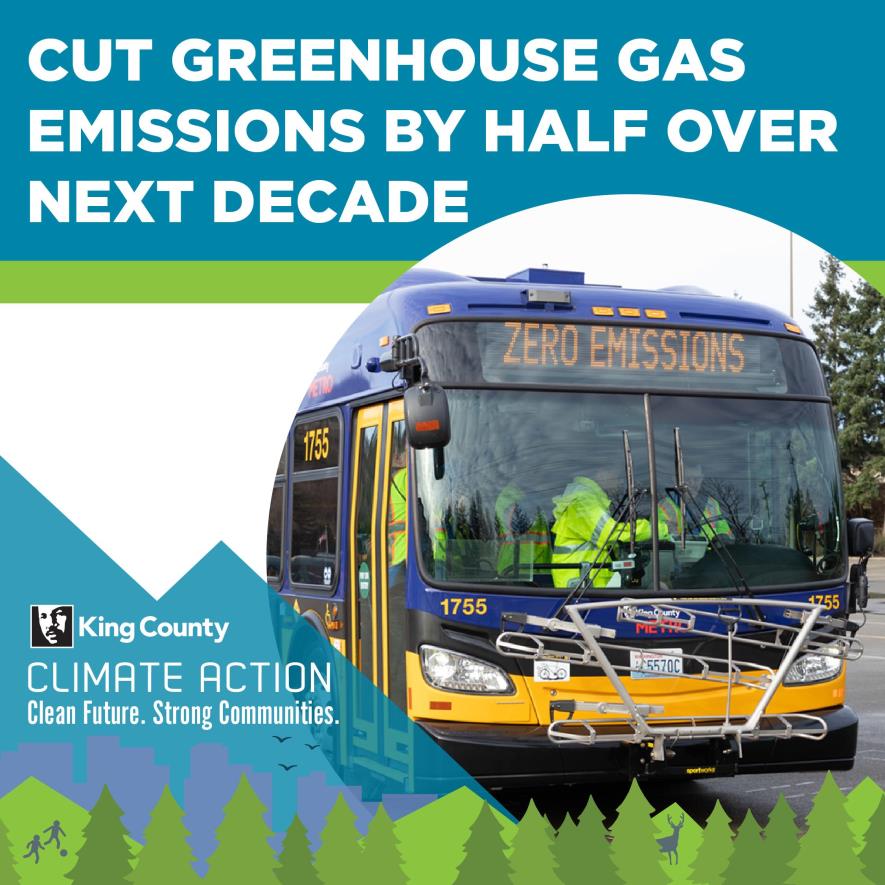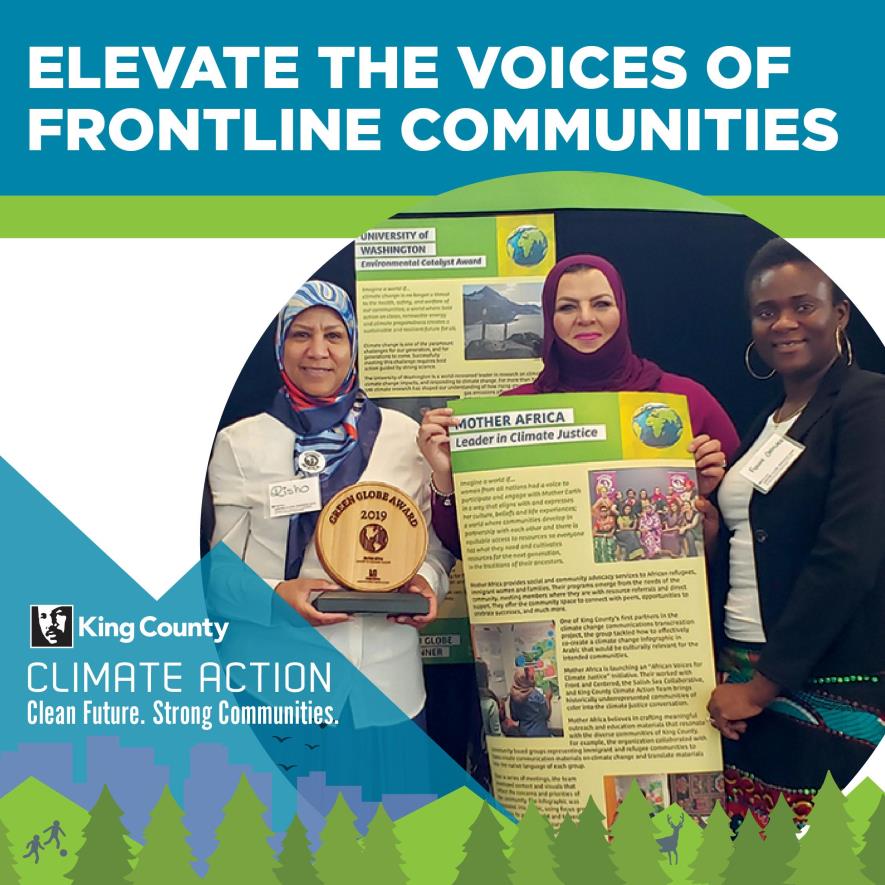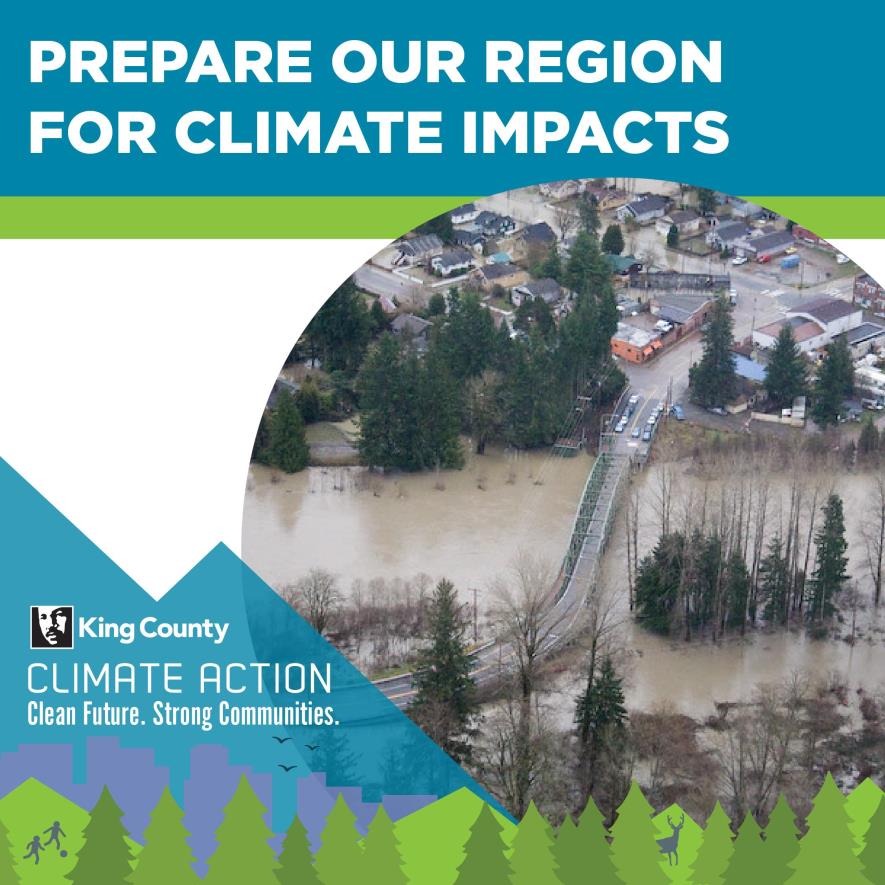Building a more resilient, sustainable, equitable King County: Executive Constantine announces regional strategy to confront climate change
Summary
As climate change exacerbates inequities and intensifies natural hazards, King County Executive Dow Constantine today announced his proposal for the 2020 Strategic Climate Action Plan, a five-year roadmap to cut greenhouse gas emissions by half, prepare the region for climate impacts, and elevate the voices of frontline communities.
Story
King County Executive Dow Constantine today announced his proposal for the 2020 Strategic Climate Action Plan, which includes cutting greenhouse gas emissions countywide in half by the end of the decade, a stronger focus on climate justice, and preparing the region for climate impacts.
“Climate change is impacting King County today, deepening inequities and intensifying natural hazards – flooding, wildfires, extreme heat – that put people, our economy, and our environment at risk,” said Executive Constantine. “We surpassed many of our goals from the current Strategic Climate Action Plan by listening to experts, basing decisions on science, embracing innovation, and forging strong partnerships. This next plan builds on our momentum, operating at a region-wide scale with a stronger commitment to climate justice.”
The 2020 Strategic Climate Action Plan is a five-year blueprint for county climate action, integrating climate change into all areas of county operations and its work with all 39 cities, partners, communities, and residents.
Executive Constantine today sent his proposal for the plan to the King County Council for approval. The plan will guide actions to:
- Reduce countywide greenhouse gas emissions by 50 percent by the end of the decade.
- Modernize codes to make buildings greener to construct, maintain, and operate while connecting them to high-capacity transit powered by renewable energy.
- Launch the 3 Million Trees initiative, increasing tree canopy, accelerating land conservation, and preparing forests for climate impacts.
- Lead with equity and racial justice, including a new section of the plan focused on climate justice driven by the frontline communities disproportionately impacted by climate change.
- Adapt policies, practices, and procedures to ensure that they account for climate impacts and ensure that each decision and investment contributes to a more resilient future.
Executive Constantine announced his proposal at a community garden in Kent where World Relief Seattle depaved and converted an underused parking lot into a local garden, increasing access to locally grown, culturally relevant food while strengthening connections in immigrant and refugee communities. The project also reduced the amount of polluted stormwater that flows into waterways.
King County WaterWorks and the King Conservation District helped kick start the project, an example of a community-led climate solution that achieves multiple benefits.
A more resilient, sustainable, equitable King County
The 2020 Strategic Climate Action Plan has three sections:
Reducing Greenhouse Gas Emissions

King County exceeded ambitious goals it set in the 2015 Strategic Climate Action Plan to make its own operations more energy efficient. The next plan recommends actions that will reduce greenhouse gas emissions at a region-wide scale, reducing countywide greenhouse gas emissions by 50 percent by 2030 and 80 percent by 2050. It also accelerates the county’s commitment to reducing emissions from its operations by 80 percent by 2030, 20 years sooner than the previous plan called for.
One strategy will make buildings greener to construct, maintain, and operate by modernizing codes throughout King County's 39 cities and unincorporated areas. The plan also recommends actions that will connect more green buildings to the region's growing transit and trail networks.
Continuing to focus nearly all new growth in urban areas will further reduce the need to drive, decreasing the amount of greenhouse gas emissions.
After surpassing the goal set in the 2015 plan to plant one million trees, King County will create partnerships and mobilize volunteers to plant, protect, and prepare a combined three million trees over the next five years. The partnership will increase tree canopy in communities where there is the greatest need. As part of the Land Conservation Initiative, King County will also acquire at least 25 new green spaces as part of investing $25 million to improve access in areas that need it most by 2025.
The action plan commits to a three-part strategy to reduce car trips through sustained and increase use of transit, focusing almost all new development in urban areas, and developing vehicle usage pricing strategies that are equitable. The county, meanwhile, commits to reducing emissions by county-owned vehicles by 45 percent by 2025.
Other key strategies include achieving zero edible food waste by 2030, commitments to advance green buildings, and leading partnerships to advance climate progress through efforts such as through the King County-Cities Climate Collaboration, known as K4C.
Sustainable & Resilient Frontline Communities

A key difference from previous Strategic Climate Action Plans -- and unique among climate plans throughout the country -- is that it leads with a new section focused on climate justice, driven by frontline communities disproportionately impacted by climate change.
The SCAP was shaped by the Climate Equity Community Task Force – a group of 22 community leaders representing frontline communities, especially Black, Indigenous, and People of Color communities – and seeks to elevate and center the leadership is impacted communities, address root causes to climate sensitivity, and build an equitable climate future.
One example of how the task force contributed to the new SCAP is the inclusion of housing security and anti-displacement as a focus area, promoting housing that is green, healthy, and affordable.
The plan builds on the strengths identified in the Blueprint for Addressing Climate Change and Health to support frontline communities by preparing for, mitigating, and addressing disparities in climate-related health impacts.
Preparing for Climate Change

The 2020 SCAP both deepens and broadens the county’s work on climate preparedness, building on the foundation from the 2015 plan to cover a wide range of climate impacts, including heavier rain events, hotter summers, lower snowpack, increased flooding, sea level rise, and greater risk of wildfires.
It commits to updating King County policies, plans, and procedures to account for climate impacts and to implementing decisions that will make the region more resilient. It calls for investing in the development and use of the best available science to inform the county’s climate preparedness efforts and creating a resource hub that will inform preparedness activities across county departments and programs.
The new plan places a greater emphasis on reducing the disproportionate impacts of climate change on vulnerable populations, increasing community capacity to prepare for and respond to climate impacts, and ensuring an equitable implementation of climate preparedness. The plan also establishes a new performance measurement framework for tracking progress on climate preparedness efforts over time.
Building on achievements from the 2015 Strategic Climate Action Plan
Executive Constantine’s proposal builds on the accomplishments that King County and partners made during the 2015 Strategic Climate Action Plan, which Denis Hayes, co-founder of Earth Day, called “the boldest he has seen.”
Achievements from the 2015 Strategic Climate Action Plan include:
- Positioned King County Metro Transit as the nation’s leader in transitioning to fleets powered by clean, renewable energy.
- Continued to focus 98.5 percent of new residential development and growth in urban areas connected to the region’s growing transit and trail systems.
- Surpassed goals to make county operations more energy efficient, reducing its own energy use by more than 20 percent since 2007.
- Accelerated the pace of land conservation with a commitment to creating more equitable access to greenspace.
- Advanced the Local Food Initiative, supporting local farmers and making access to nutritious, locally grown food more equitable.
- Through the King County-Cities Climate Collaboration, led efforts of cities representing 80 percent of the county’s 2.25 million residents to advance transformational state energy policies that will result in stronger building and appliance efficiency, conservation for fossil fuel gas, and 100 percent clean electricity.
- Launched a frontline community climate partnerships program and supported leadership development, language access, climate equity workshops, community panels for environmental conferences, and climate literacy in frontline communities.
- Strengthened land-use codes to address sea level rise.
- Launched the Puget Sound Climate Preparedness Collaborative, developed in partnership with neighboring counties, cities, and other Puget Sound organizations to enhance coordination and improve climate preparedness outcomes in the Puget Sound region.
Relevant links
- 2020 Strategic Climate Action Plan
- VIDEO: Overview of 2020 Strategic Climate Action Plan
- VIDEO: 'Fierce strategy and shared purpose': A regional strategy to confront climate change
- VIDEO: Executive Constantine hosts press conference to announce regional climate strategy
- Top 10 Accomplishments of 2015 Strategic Climate Action Plan
Quotes
Climate change is impacting King County today, deepening inequities and intensifying natural hazards – flooding, wildfires, extreme heat – that put people, our economy, and our environment at risk. We surpassed many of our goals from the current Strategic Climate Action Plan by listening to experts, basing decisions on science, embracing innovation, and forging strong partnerships. This next plan builds on our momentum, operating at a region-wide scale with a stronger commitment to climate justice.
Black, Indigenous, and People of Color communities have survived disproportional climate and environmental impacts – they are resilient and have a lot of knowledge that has been passed down through our cultures, and relationship to the earth. When you build trust through authentic relationships and value people's lived experience and expertise in policymaking – it's transformational.
As an Environmental Scientist and Tribal member, I am enthusiastic about the work put forth by the Climate Equity Community Task Force. The pathway to confronting climate change needs to center the most impacted – with benefits to the region as a whole – by leading with action steeped in community values and demonstrating how community-based efforts are imperative to climate justice and science.
I embrace the slogan of JustLeadershipUSA, an organization dedicated to decreasing the population in US correctional facilities: Those closest to the problem are closest to the solution. The Climate Equity Community Task Force is revolutionary because it elevates the expertise, wisdom, and lived experiences of frontline communities, particularly Communities of Color, to lead the way toward climate justice. It would be wise for the county to continue to use this model and lean into the leadership of the Task Force on the pathway forward.
At a time when our national government is failing us on climate, King County will keep leading the way with aggressive actions to reduce the pollution that causes climate change. The Strategic Climate Action Plan’s focus on equity is so important to low-income and diverse communities in South King County, where people are hit hardest by pollution and climate impacts.
The 2020 SCAP is an exciting contribution to the field of climate change adaptation. The plan’s comprehensive approach to climate preparedness – including an emphasis on regional partnership, equitable climate action, building technical capacity, performance measurement, and incorporating climate preparedness into decision-making -- provides the necessary foundation for effectively addressing climate change impacts in our region.
We believe it is imperative to weave equity into every aspect of King County’s work, and the community-based efforts of the Climate Equity Community Task Force and the Sustainable & Resilient Frontline Communities section should be continually uplifted through building trusting relationships, co-creation from the beginning, and shared resources. We look forward to continued collaboration to support transportation equity, open space, and climate justice.
Moving to a more circular economy is a critical component of climate action. Consumption, and its corresponding waste of materials, has major environmental and climate impacts. King County’s leadership on zero waste and sustainably managing materials is a crucial step for reaching climate goals. Zero Waste Washington supports King County’s 2020 update to its Strategic Climate Action Plan, as it takes the necessary steps to reinforce the regional need to reduce unnecessary consumption and reduce waste.
The county’s climate plan is ambitious and, we believe, deliverable. Climate change requires thoughtful, strategic and aggressive actions and this plan lays those out in a way that ensures the county will protect its citizens, its businesses, its schools and institutions and its treasured natural environment. As the county works to divert materials from the landfill, sequester carbon, build sustainable and resilient communities with equitable green jobs, we standby, supportive of this plan.
The International Living Future Institute (ILFI) is pleased to support King County’s 2020 Strategic Climate Action Plan, which targets significant reductions in building energy use and GHG emissions by leveraging the most ambitious, advanced, and holistic green building, equity, and social justice standards, including the Living Building Challenge and Zero Energy programs. With policies and long term investment in frontline communities, the new SCAP prioritizes an equitable climate future for all residents of the County.
The embodied carbon emissions associated with building materials must be addressed to achieve science based carbon reduction targets. It is exciting to see King County begin to address these impacts through the 2020 SCAP and their commitment to assessing and reducing the carbon footprint of building materials in the procurement process.
The SCAP forest strategies are aligned with KCD priorities and I look forward to working with King County staff to improve forestry practices on private lands and promote forest restoration and land conservation County-wide.
The 2020 SCAP’s agriculture and farming commitments are aligned with our work, especially the call for continued investment in farmland access. I appreciate the SCAP’s specific thinking throughout of how to amplify the voices and needs of frontline communities.
Climate change presents major impacts to how we grow and distribute food. The new 2020 SCAP is a strong, equitable roadmap to a future of climate resilient food systems in King County.
The opportunity to think together, thoughtfully map out and implement a plan to sustain and support our local food producers and agricultural lands is critical. Thank you to the County and its leadership for your willingness to prioritize and collaborate on these pressing issues.
Refugees and immigrants – along with other BIPOC communities – are often the most affected by climate change and environmental threats, yet they have historically been excluded from policy discussions and structures that directly affect their health because they are not landowners. This Strategic Climate Action Plan has the potential to finally correct that by promoting community-led solutions that repurpose neglected urban spaces to increase equitable access to culturally relevant food and greenspace.
For more information, contact:
Chad Lewis, Department of Natural Resources and Parks, 206-263-1250
 Translate
Translate

